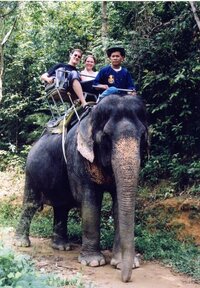 The first time I visited a developing country as an adult was Thailand on my honeymoon. To say it was an extremely different experience to the life in Perth I was used to, was a vast understatement.
The first time I visited a developing country as an adult was Thailand on my honeymoon. To say it was an extremely different experience to the life in Perth I was used to, was a vast understatement.
So much was different – the culture, the infrastructure, the people, the politics and the economy. One of the most striking features was the relatively low cost of living (food, accommodation, transport and utilities). It was great, as an Aussie a paycheque that could be stretched really far in a place like Phuket. We could live like a king with a regular middle-class Australian wage.
This probably was the first time I had considered a life outside Australia. It was a passing dream which I disregarded as fanciful at the time, but something had started nonetheless.
I found the people in Thailand, across the board, so warm and friendly. The customer service I experienced and shops and restaurants wasn’t something I was used to. They would really bend over backwards to please a customer. I recall purchasing some DVDs from a shopkeeper and for me the price was extremely low already and I felt a little bad for haggling with him. Why was that? I was so used to the standard of living in the “lucky country” that anyone else who lived in circumstances that I perceived less than that evoked in me a sense of sympathy. It sounds all soft and cuddly, but in hindsight, it was a bit arrogant actually.
Flash forward to Bali in 2005. It was just 2 weeks after the 2nd Bali bombings and Erin & I had booked in a holiday several months prior. We had considered cancelling our trip, but decided that we’d go anyway. The airline was only refunding flights within 2 weeks after the event, and we fell outside that by just a couple days. We figured, we were just as likely to die in a freak accident in Perth as another terrorist attack.
This was another occasion we really noticed the difference in the lifestyle of folks in a developing country. The tourism industry in Bali was devastated by the bombings and walking the main streets in south Kuta was like a ghost town, but we decided to enjoy ourselves anyway. Again, I found myself in a number of situations haggling with shopkeepers, and feeling a bit sorry for their plight, I gave them a higher price than I might have done otherwise. I can be a tough negotiator, but I can also be a bit of a softie.
But after a few more visits to Bali I started to notice something that I overlooked before. So many Balinese spend such a relatively small time each day actually “working”, by what I mean in Australian standards. If you get a paid to a do a job, you better do it full-on for 8 hours of a the day and then you go home, watch TV and put your feet up. The Bali folks were spending a lot of time talking to each other, sitting around, eating, laughing and talking some more. I wondered in the back of my mind why they would be so lazy. What was it about their culture that encouraged that? I was used to working 40+ hour weeks and I felt anyone doing less (much less in their cases) was slacking off. Perhaps if they worked a bit harder, they wouldn’t live in such poor quality housing and wear such poor quality clothes. Again in hindsight, this proved to be a bit of arrogance. I had just assumed that my way of living was right and they were living a sub-par life.
It turns out I was wrong. They had it right all along.
It took me many years, but eventually I had an important shift in my awareness about what it really means to “work” and what kind of things were really important to me to live a fulfilled life.
The turning point began when we started to travel and live in developing countries and I had a crisis of conscience. How could I live in an area where the relative cost of living was so low that I could live like a king, on the backs of the lower class who made that kind of thing possible? Wasn’t that exploitation? It really made me think.
Equality
I like to look to history to see how things have been done. It seems in every developed culture since the earliest records, there has always been an echelon of society who lives at higher standard than the vast majority. There’s a disproportionate distribution of wealth and power. I looked at the cause of my perspective on this topic and it was highly influenced by Australian culture. If you’re not familiar with it, you could summarise it as “tall poppy syndrome”. Those that stand out get cut down to size. The left-leaning side of politics would call it a “fairer” country for all. Their policies have introduced things like:
 Tiered taxation (so the richer folks pay a substantially higher rate of tax)
Tiered taxation (so the richer folks pay a substantially higher rate of tax)- High levels for the compulsory minimum wages (to protect the workers from unscrupulous employers)
- The dole (regular payments to those find themselves unemployed)
- Medicare (public government-subsidized health care)
- Forced superannuation (similar to 401k in the US, but the employer has to be an additional 8% on top of the employee’s wage to a superannuation fund)
- Paid sick leave (at least 2 weeks per year, cost covered by employers)
- Paid annual leave (at least 4 weeks per year, cost covered by employers as well)
- Compulsory school education (for children ages 6 to 16 - grades 1 to 10)
- Aged pension (regular payments to all residents once they reach 65)
- Public housing (free or highly discounted housing for low income earners)
- HELP (Higher Education Loan Program for tertiary students so they can go to university for free and pay back the loan when they have a job)
- Carbon Tax (taxation on the major carbon pollution contributors, which just ends up raising the cost of living)
Some of those things sound nice on the surface (and don’t get me wrong, they can have their place), but what they breed is a culture that despises and discourages excellence and de-emphasizes the importance of the family unit. I know, it sounds pretty harsh and I’m sure I’ll get some negative comments about that, but they’ll probably be Labor or Greens voters, so I won’t take it personally.
If you work hard in Australia to build a successful business and make more money than the average Joe, you have to work even harder to pay your extra share of taxes. Many of the financial incentives and benefits either don’t exist for higher income earners or are substantially reduced, such as:
The “baby bonus” (payout when a baby is born – the federal government thinks adults need to be paid to make babies because of the pending population shortage – otherwise there won’t be enough folks to pay taxes)
Subsidized daycare (when a mother returns to work and puts her young child/ren in daycare, she ends up almost paying her full income to cover the daycare costs, defeating any purpose in returning to the workforce)
Even better, as a business owner no one will pay for you to take holidays or if you’re sick. But if your employee wants a holiday or has the sniffles, then you lose productivity AND also pay their wage. A double whammy. When you also take into consideration the cost of running a business – bookkeeping, tax, workers compensation, superannuation, insurance and more. Why would anyone want to bother starting a business? It’s no surprise 80% of small business fail within 2 years in Australia. Folks just give up and go back to being an employee of someone else. It’s so much easier!
The essence of the leftist policies may have all the best intentions, but the end result is a culture that wants equality at all costs, even when it undermines the family or personal sovereignty. This is a relatively new concept by historic standards, with the Marxism only being developed in the 1800s, but what does equality really look like? How does it compare to most other South East Asian cultures? And how does it compare to my first-hand experiences?

Perhaps it means older folks won’t be left alone in the twilight years? That seems like a good reason to provide pensions. Many SE Asian cultures encourage children to support their parents as they get older, both financially and practically. This builds a stronger family unit and provides other benefits like free care for young children if the parents have to work. Even better, the children and grandchildren can learn from the experience and wisdom of the older generation. Compare that to how many older folks in Australia are tucked away in a nursing home separated from their families, just counting down the days before they croak? How many old people live alone, disconnected, with little or no contact with their children and grandchildren? How has this affected society?
Maybe giving handouts to people who can’t find a job means they won’t starve? Ask a Balinese person what they will do if they don’t have enough money to eat or pay the rent and they are likely to give an answer like “I’ll set up a food stall”, and the incredible thing is because of the relative lack of bureaucratic red tape compared to most Western countries, they actually can – probably even the same day. Albeit, the food hygiene standards are a lot stricter in Australia, but you understand where I’m coming from. When the consequence of no employment is taken away, the drive and ambition to fill the need is diminished. I know first-hand when I was on “John Howard’s surfing team” for 3 months after finishing university. It was so hard getting the motivation to keep looking for a job, and I’m a pretty motivated guy. The Australian education system doesn’t really encourage entrepreneurship or innovation. It’s designed to pump out more taxpayers who will do what they are told. So it’s no surprise that a significant percentage of Australians only live from week-to-week, a slave to their job. If there was no unemployment payouts, how would that change the attitudes of Australians?
The idea of high minimum wages is where most of my issues boiled down to. We can thank Bob Hawke for that. At the end of the day, it is illegal for an employer to an employee less than what a defacto government agency determines is “fair”. I thought we lived in a free economy where prices were based on supply and demand? But I guess that isn’t really “fair”. When you couple this with the option for an employee to say goodbye to their boss because they can join the unemployment queue at Centrelink to collect their regular payments, you don’t have to work for pittance anymore. That’s good news! After all, if employees have more money to spend, they will buy more stuff (they don’t need), which creates more jobs and even more people have more money to spend (on things they don’t need), so it is good for the whole economy. Yay! Rainbows and lollipops!
But what happens after that? As an economy gets stronger (in a free market), the currency of that country also tends to get stronger. But while that’s good for employees spending their money on imported products (like electronics, TVs, computers, clothes, cars… actually, almost everything in an Australian house is made overseas – probably from China), that’s bad for manufacturing, exports and tourism. So parts of the economy will have less money to spend and others will have more. But Australia is the “lucky” country! It sure is. Thanks to China’s extremely high demand for resources such as iron ore (which Australia has plenty of), mineral exports will do well – sorry tourism, not much luck for you.
So back to minimum wages - this affects everything from food in grocery store to food on a restaurant table. Any time an Australian hand is involved, the cost goes up and up and up. This means the awesome minimum wage job which just got an awesomely high paycheque suddenly isn’t so high after all since the spending power is greatly diminished.
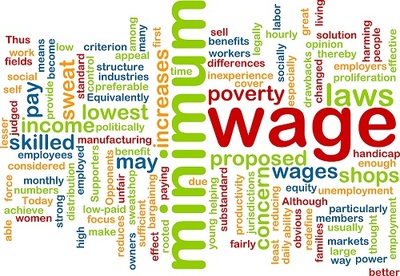
It is simply unnatural to try and force financial equality on an entire country or culture. And already Australia is fragmenting into a “2 speed” economy, with some people doing well financially, while others suffer, regardless of what strategies the government uses. Why is that surprising? It is simply a way of normal behaviour that a group of people will gravitate to. This is the premise of a free economy anyway – that people will find a way to do things in the most efficient way naturally.
Compare this with what I experienced in Bali. Yes, the class gap was noticeable, and very wide by comparison to Australia. We met people earning $3 per day and others earning $700+ per day. The difference between the two? An employee in a fixed income job compared to an entrepreneurial business owner who took a risk, made an investment, and was benefiting from the rewards. That seems sensible, doesn’t it? If the person earning $3 wasn’t willing to take a risk or put their own money on the line, they shouldn’t benefit from the spoils to the same degree.
The broad range in income levels also makes some things possible that are simply not possible in Australia, particular in service-based in industries. One example that jumps to mind is food deliveries. When we stayed in Bali we really enjoyed getting delicious dinners delivered to our door. One phone call and 30 minutes later, it arrived. It was so convenient, especially with 2 young children. This kind of thing is almost unheard of in Australia (except for pizza deliveries) because of the relatively high cost of labour compared to the cost of food.
Before you compare Indonesia and Australia and say they are just too different and there’s much more than the low cost of labour between the two, consider Malaysia. This is one of our favourite countries for many reasons. It’s got the equivalent quality of infrastructure – roads, power, water, electricity, internet. But because the entry level tertiary-qualified jobs start at just $20 per day and retail-level jobs are even less, so many more businesses can be viable. This is not only good for the economy, but also to the overall quality of life because more competition and options is better for the consumer, and more competition which drives innovation. Compare this to a retail-level job without any tertiary education in Australia that would pay at least $120 per day. No wonder why so many Aussie business close within 2 years. Staff wages are the highest cost for most business, so it’s so darn hard to make a profit with costs like that!
It is the very gap in incomes that make business start-ups possible. And it’s these businesses that improve the quality of life, not only for consumers but also employees. Increasing the base wage of the employees just stifles the economy. Maybe there aren’t many slums in Australia, but is that worth the cost of what is being forfeited?
Financial inequality shouldn’t be confused with lack of empathy. The solution to the social issues the government is trying to resolve is not dealing with them at the federal level, but rather strengthening and empowering families to work together for a more sustainable future. For example, it makes a lot more sense for a husband and wife to care for their parents, rather than a government agency.
So my experience has lead to me to understanding that inequality in income is a natural and positive dynamic and shouldn’t be battled in the name of “fairness” where everyone loses.
The 40+hr work week
I touched on the topic of work-life balance in my previous blog post. I think it’s also worthwhile mentioning that while in Bali I found the pace at which many people worked was rather confronting for me. As first I found it painfully slow. But after a while I began to appreciate the speed at which life moved. It was actually more enjoyable and sustainable. There was time to smell the roses, time to enjoy the most of every experience, time to invest in my family.
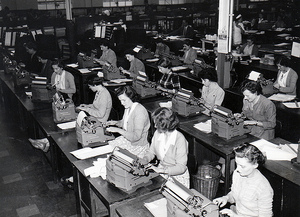 This is an ongoing focus point for me as I’m naturally a very motivated person. I like things to get done and get done quickly and efficiently. So I actually have to work on slowing things down in order to squeeze the most out of life, otherwise I run the risk of letting it fly by and 80 will come along before I know it.
This is an ongoing focus point for me as I’m naturally a very motivated person. I like things to get done and get done quickly and efficiently. So I actually have to work on slowing things down in order to squeeze the most out of life, otherwise I run the risk of letting it fly by and 80 will come along before I know it.
What is so sacred about the 40 hour work week anyway? Who decided that was the right amount of time? In the 1950s, the average white collar would work less than that, and at the time it was expected to drop even further with improved technology. Gee, they were wrong. With our mobile phones, laptops and other gadgets today we are more connected than ever, needing to cram even more work into a limited amount of time to stay one step ahead of the competition. We’re not working less because of technology, we’re working more! Hang on, that doesn’t make sense does it? What do you think further improvements in technology will bring - less work?
When I watched the Balinese work and socialise, there was something natural and organic about the whole process. After immersing myself in the culture for 2 months I found the secret to enjoying work more is to do less. I realise there’s countless motivational and self-help books out there, and I’m not trying to sell you something here. And I’m not saying work is bad or we shouldn’t work at all, what I’ve found though is doing too much of a good thing isn’t good sometimes.
After all, it’s important to have a clear idea of the “why” behind what we do to generate an income. And if you’re not enjoying it, really enjoying it, then something isn’t right. Reducing that magic number from 40 and slowing down the pace of life is a good place to start.
Why work?
I wanted a clearer, more sustainable “why” behind the reason for working. I wasn’t satisfied with the subconscious Australian pattern of getting a job to pay the bills and afford the dream house. When trying to decide what is the best amount of time to work each week, questioning the reason to work in the first place also goes hand-in-hand. The obvious reasons were to provide for my family and also because I enjoyed my work. As a human I’ve also been designed to be productive, from the cellular level up to my thought patterns. But sometimes it so easy to get caught up in doing the work, that you never stop to think “why am I doing this?”. It’s a simple, yet profound, question.
By using ones God-given talents and gifts to help others, a deep sense of fulfilment can be achieved. It partially answers the deep question of “why am I here on this planet?”. Doing something of value also provides a feeling of self-worth and makes up part of an individual’s identity. It also helps strengthen our society. Men in particular, gain deep fulfilment in doing something productive. It’s hard-wired and demonstrates itself from an early age.
We found that many Balinese who live in a traditional family compound grow their own food on their property. This means they don’t heavily rely on outside food sources. Apart from the health benefits, there are also substantial cost benefits. In some cases, they could even cook every meal with the produce from their gardens and rice fields. So if they didn’t need to pay for housing or food, why else would they work? In their case, a significant portion of their income went to pay for religious ceremonies (up to 45%). That gave them an answer to their “why”, something I found fascinating.
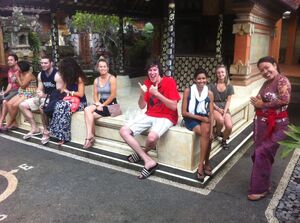
But the lesson I’ve taken away from this is looking at the reason for working in a different light and realising the typical Australian perspective of “paying the bills” isn’t the only option available. And many of the things I thought were absolute necessary for daily life really weren’t. Seeing the world from someone else’s perspective can be one of the best gifts, an absolutely essential ingredient in developing understanding and empathy for your neighbour.
Quality of life
This made me question exactly what do I need physically to live a fulfilled life. It’s so easy in Australia to get used to things that are considered normal, but never ask the question “why”? Are they really valuable? Do I really need that? Well, based on the Balinese we visited, many things I thought were so important, really aren’t that important at all. Don’t get me wrong, I’m not going to ditch all my modern conveniences and move into a mud hut, but the situation encouraged to me to challenge the value of material possessions and see the merit in alternative lifestyles.In my travels so far I’ve been privileged to get to know so many fantastic, interesting people. One of my favourite experiences in Bali was visiting the homes of regular Balinese folks. We went to a couple homes that demonstrated the broad difference in incomes in Indonesia.
The really fascinating thing is that both the poorer and richer Balinese were very content with their quality of life. They didn’t have a big flat-screen TV and it didn’t bother them. Instead, they spent the time talking to their family and friends. And I’m not talking about Facebook or Twitter – real, in-person conversations. What a novel idea.
I realised that the quality of life for each person is very much a relative concept. It really comes down to expectations. If the poorer family expected to have a few chickens and couldn’t afford or find them, they’d be upset. I couldn’t really care less for chickens though. The amazing realisation is that I have complete control over the expectations I set. As long as you allow TV shows and magazines to set your quality of life expectations, you’ll be slave to the next fad or fashion accessory. When you realise you don’t really need much to be happy, then anything you do get is a bonus. That’s the secret to contentment.
Who is taking advantage of who?
Back to my original thought of exploitation, I initially felt bad staying in developing countries with a relatively high disposable income by local standards. Perhaps I should have given some of my money away. What would have that achieved? A “fairer” country? Was it right for me to take advantage of these poorer folks and life like a relative king when they lived in very modest houses?
Having processed the thoughts discussed so far, I’d like to share an example of something that changed the way I looked at this question. When walking the streets of Ubud, Bali there are so many shops selling similar products or services. I asked the question, how do they all stay in business, the competition must be fierce. Well, not really. The answer is simple. Their cost of living is relatively low, so they don’t need to earn a huge amount to live a satisfied life. In a shop selling wooden ornaments, a shopkeeper may simply sit in the doorway all day and have 1 or maybe 2 customers – some days no customers. But the 1 customer would spend what would appear to be a modest amount by their standard, but it represented a full day’s income to the shopkeeper. Keep in mind the average Balinese person earns AUD$3.30 per day. So a tourist spending $20 in one shop without a second thought means almost a week’s required income in just a few minutes of work. Every so often a tour bus would come by and several dozen or even several hundred new, fresh tourists would descend on Ubud. Just imagine an hour’s worth of those kind of customers means the shopkeeper’s entire month’s income is covered.
This was the answer to the question – how do they work so little? When I thought about the number of hours I had to work each week before starting our travels, I felt a bit ripped off. I’d work 50+hr weeks to live a comfortable lifestyle, but it was hard work. Yet this small business owner could work just a couple hours a month by comparison. I think they were smarter, not me! My university degree and technical knowhow didn’t make a difference. They were working smarter, not harder. In fact, I almost felt like I was being taken advantage of, mainly because I was conditioned to think that you had to work a certain number of hours to be useful and not lazy. How untrue!
Wrap up
So the outcome of my ponderings on the great equality myth is that I no longer feel bad about having a relatively high disposable income in developing countries. I’m grateful for being blessed by growing up in a country that would give me this kind of opportunity. And I know how much benefit I can be to a small business owner when I visit their store. It also means I don’t feel too bad when haggling the price down, after all it’s a win-win situation.
So far this journey has encourage me to ask questions that I hadn’t done so before and expand my thinking further. For that I’m a better person, a better husband and father, living a more fulfilled, enriched life. And the best is yet to come.

Josh Bender
is the better half of Travel with Bender. A Web Designer & Internet Marketer he has the most lateral & logical thoughts. Josh constantly educates himself not just in his industry, but every area of life. His deep thoughts will add a depth to our blog you might not get from me. I thank God for this amazing man and hope his incredible insight will be of some benefit to you.
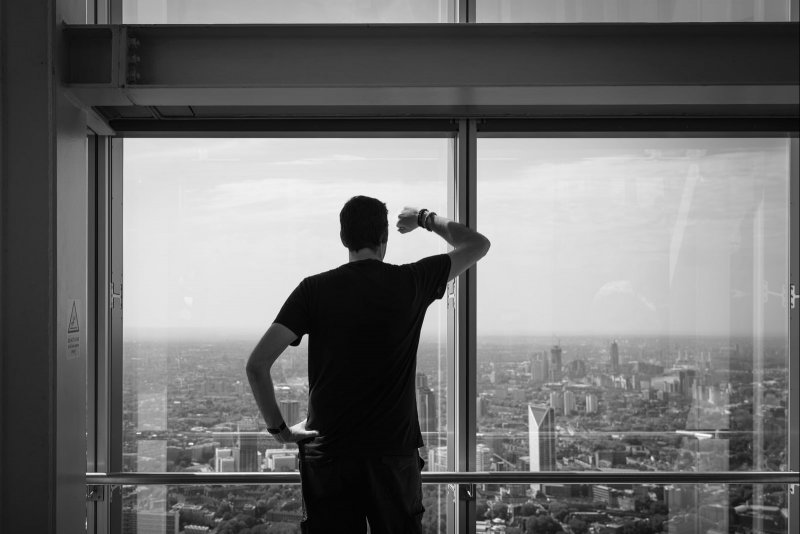

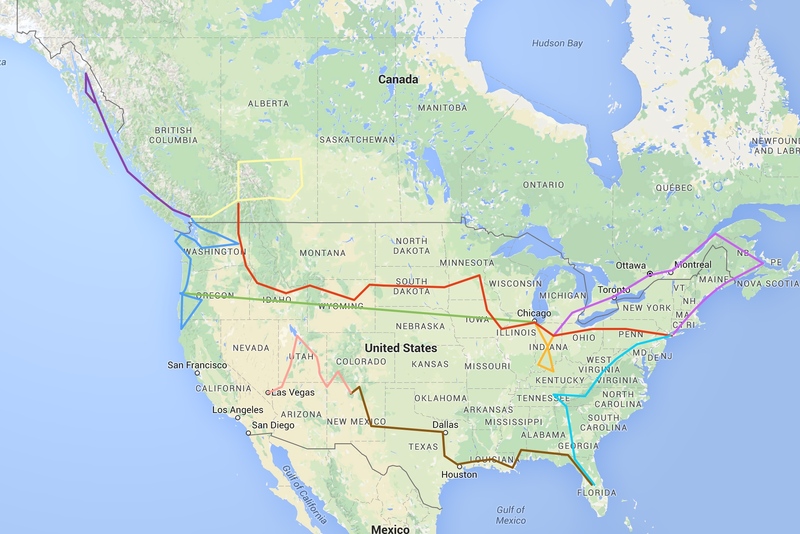





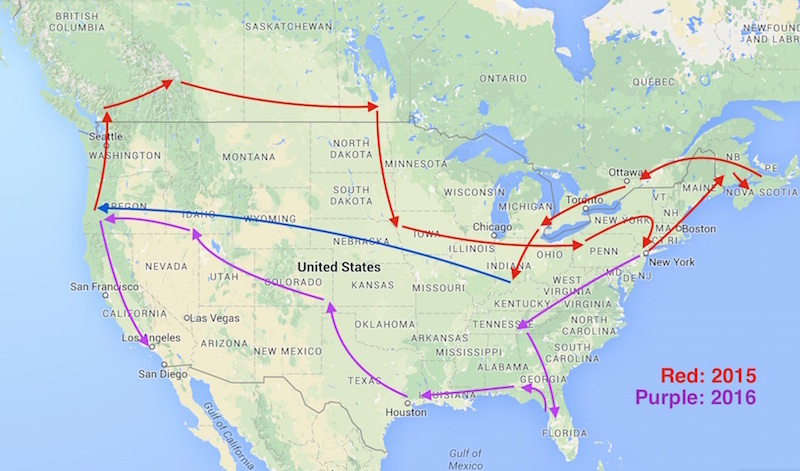




Reader Comments...
"I respond to every comment by direct private email. I look forward to your feedback" - Josh BenderI've got to say, Australia seems like such a socialist country. When we're there, we definitely get the nanny-state feeling. Sometimes that a good thing and sometimes it isn't. We have used, and loved, lots of the things that the Aussie taxpayers provide like the healthcare, awesome playgrounds and well-kept beaches. We just get the overwhelming sense of government breathing down our necks, much more so than in NZ.
One of the thing that irks me about SE Asia is the lack of service culture. You can have ten waitstaff standing around in an empty restaurant, chatting and texting, which you sit waiting for someone to take your order for ten minutes!
I think it depends on where you are in Asia, Bali has amazing service and so does Manila. Boracay was a bit slack and so was KL, you are right. I am with you: complete nanny-state. In Perth your child has to be in a carseat until 7 years old - seven! My husband and I have differing views on this whole topic, but I certainly do not miss his 40-60 hour work week :)
Hi Josh,
It sounds like you are coming to a lot of the realisations and feelings that I had after the first 12 months of travelling through South East Asia (albeit articulated much more clearly :)). I 100% agree that in Western countries the workers are seemingly hoodwinked into working harder under the premise that that is what is needed to get ahead. Working smarter seems to me to be a much better way :).
As we are both Web Designers/Developers we are in a relatively unique position given the flexibility of our skillset. Having said that I know a lot of web developers back in Australia who wouldn't even consider taking the risk of living the lifestyle we do... Following on from your analogy of the entrepreneur earning greater rewards for their risk, hopefully willingness to take a risk is the catalyst for our reward (an incredible lifestyle).
I was sitting on a chairlift while snowboarding today and I was chatting with a couple of guys a few years older than me and we were chatting about my lifestyle and one of them turned to me and said, but it must cost you a fortune to do that... When I told him some of the costs of our lifestyle and how cheap it can be if you want it to be, he was amazed!
One last thing... The only thing you didn't address in your article regarding Australia and New Zealand is the incredibly inflated prices for land and housing. I don't know if it is the cause of high wages or the result of high wages. But for me this is probably the one and only reason I will probably never live permanently in Australia again. To buy a reasonably decent house in Brisbane you are looking at between $400,000 and $500,000. Lets say you have a loan of $400K. The loan repayments are roughly $550/week for the 30 years. So the total repayments on that loan (assuming the rates stays steady) is approximately $860K. That's $460K that you are paying to the bank or approximately $15,000/year... Admittedly the value of the property will probably go up in that time but the noose that is tied around your neck for 30 years doesn't really seem worth it.
After travelling for almost 3 years we still haven't quite found that perfect place that ticks all of the boxes... But you know what, I am happy to keep looking for it.
Thanks for writing such an well considered (and epic) article. It was fun to read so many of my thoughts articulated so much better than I could ever have written them.
Cheers,
Colin
Replying to Bethany, I think the longer you spend in Asia your opinion and actions change somewhat. The lack of service culture that they have really annoyed the crap out of me for about the first year or so. Then I started to relax and understand that time isn't quite as strict as it was when I was back home so I started to relax more about it.
Having said that, with kids there are times were you can just relax and hang around, so in those instances I now tend to pre-empt the slower response times and simply head over to the counter or directly ask for service. No one seems to get upset, they know they be back to sending text messages on their phone to the friends in just a couple of minutes :) Once you get over that initial 'why aren't they serving me' and just ask for service it all goes a lot smooth. I hope this doesn't sound condescending, because I totally understand where you are coming from... I had exactly the same thoughts for a long time.
When we were at the dentist in KL she was on Facebook. And she left it open the whole time she was "servicing" us haha. Yup if you want service, ask for it and it is given quite friendly. Colin - I have passed your comments onto Josh, thanks for writing!
I notice the service, or lack there of, everywhere after visiting the US. I just couldn't get over how great it was. We're pretty fussy and often had a tired, screaming baby and nothing was too much trouble (except for one bitchy guy waiter in Scottsdale who basically told us to shut our kid up!). It's easy to get used to that. Even in NZ, I could go to the supermarket and not have any staff speak to me when I pay. It just annoys me now.
@Bethany, the service I've experienced does vary throughout SE Asia, but I've found the majority of places we visit have great service. There's always exceptions to the rule. There certainly are ups and downs to a nanny state. People who love security will being coddled by the government. But to be it just inhibits a natural freedom that is hard to describe until you've been outside "the system". A bit like the Matrix :-)
@Colin, thanks for your feedback. The high cost of housing is certainly a problem in Australia, but not unique. I agree about the noose with a home loan to get the great Australian dream. Figures show that the actual increase in value a house over 30 years is completely offset by the interest paid on the loan, so the owner doesn't benefit at all. It's just a forced savings account.
The high cost of labour has been increasing the cost of building a new house which has doubled over the last 7 years. The high cost of new houses has propped up the market for established housing. There are also safeguards in the Aussie banking system that minimise the chance of a US-style crash. We can't just close a house and walk away with no repercussions like they can in the US. But it certainly does contribute to the high cost of living. Immigration and an artificial shortage of land also keeps the property prices high. Compare this to Singapore where the cost of property is high as well (because there is actually limited land), but the cost of food is extremely low, and other expenses are reasonable (except for cars, but their public transport is excellent). We ate at a local restaurant for around AUD$2 per person. It's infrastructure is superior to Australia in so many ways. To me, Singapore is the best example of what a society should be like. The government has some input to help motivate private investment (rather than outright public ownership), and the culture fosters accountability and personal responsibility. There are some laws that seem crazy to an outsider (like no chewing gum), but the locals don't even consider that something they'd want to do anyway, so they're not missing out. The only reason why we don't setup a permanent home there is that there are even cheaper places to live. I love everything else about it. We'll keep looking too.
Hey Josh,
Awesome article. I agree with around 99% of what you've written, though just to play devil's advocate... do you think there's anything you could be missing through the prisim you view the world in? We are an incredibly fortunate people. We're born and brought up in countries where being relatively wealthy is the norm. I realise that within our own spheres and systems, 'rich' is relative, but we are never really in a position where we can ever be unsure about our ability to have the things we truly need. As far as a global sphere goes, because there are markets within markets I'm almost tempted to think that although you're able to look at a picture of these societies countries as say they are doing ok, how many of those as a percent would you really want to walk in the shoes of... presuming you had no option to 'check out' all the way from birth till the end of their lives? Not only this, but because of our great comparitive difference in financial wealth and influence, we are in the position to come from countries and civilizations that have the ability to pretty well control the world. (I'm trying not to come across as conceited here, but I think we have so far been able to demonstrate so far that across continents we have the power to change other people's circumstances to benefit our own ends if we really want to... either directly/indirectly or intentionally/unintentionally).
One of the greatest measures of change I think in the late 20th/early 21st century is the smoothing over of world markets. As the boundaries fall for us to be able to do business with one another and from where it's going to be interesting to see how both our own countries and others who are in a position to well capitalise off this change deal with change. Westerners will probably have to start getting used to living within our means a little more where as others may find themselves earning more money than they need. Of course do you think it's likely that people who are able to benefit from their new wealth will fall into the same pitfalls we have been able to?
Another thing to look at may be people and cultures who are not quite in a position to benefit from increased trade. It probably won't be possible to visit townships in Somalia for example but just some more things to think about - if you like considering these things.
Finally - the question over who is taking advantage of whom? Maybe ask yourself who has the benefit of being able to get up and travel - work remotely, set up a business or financial opportunities that afford you the ability to do so and spend so much time with your wife and children. We have 'options'. Personally I think the difference is key in our education and our personal willingness to do things differently that determine how much we draw from or put into life. What cultures or systems we are born into only determine our starting point and perhaps how hard we have to work to get wherever or whatever it is we want.
By your last paragraph it seems like you've put a lot of thought into this which is great. Observation is a marvelous thing and I love seeing other people who make worthwhile use of it.
A great read thanks for sharing.
@Ashley thanks for your feedback and insight. Naturally, my viewpoint is limited to my experience and that is always expanding, and I'm always open to challenge my preconceived ideas. I don't know if I'd agree that the vast majority of Australians are "rich" - a very large portion of them survive week-to-week relying on each paycheque. The thought of losing their job means their quality of life and options would be very limited very quickly. I consider that a modern form of slavery. Everyone has to start somewhere in their career, and there's no problems working for someone else at the end of the day. But if a persons outgoing expenses are the same as their incomings, then regardless of how much their earn, they'll still be a slave. The same occurs in any country and any society.
The biggest factor holding people back from changing their circumstances or quality of life is their own thoughts. The same applies in Perth, Bali, KL and even San Diego. The more people I meet, the less important Australia seems to be in the global picture. Americans think the US is the centre of the world and that everyone else is jealous of them. Most people really don't give too much thought out Americans in Asia. The 21st century will be focused on the global power-shift from the US to Asia (in particular China). By the end of this century, the US will be like the UK now, a shadow of their former glory. But life will go on.
But you're right, the new global powers will still fall into the same pattern Western society in terms of a split between those with more disposable income and those without. It's just human nature, government policies won't make any difference. But Australia is uniquely positioned to benefit from the growth in Asia which is good news for us.
Good question about who has the benefit of working remotely or setting up a business. The reality is that almost anyone can do it if they put their mind to it and make a commitment and take a risk. Self-education is the most important key (not to be confused with education in a school or university). A bit of hard work is required, but working smarter is the key. I've seen people do it in richer countries like Australia and poorer countries like Philippines. I'm not trying to sell that kind of lifestyle to anyone but if anyone needs to some advice and serious about doing it, I'm more than welcome to help out.
Thanks for reading the blog and I look forward to more feedback on future posts. Take care.
Its true Ash, we have met people living on less than $2000 a month as we go. Some volunteer, some write blogs for money, some teach English, but the only thing limiting oneself from travel is the mind. Anyone can do it.
I guess that's the part where I agree with everything you're saying. People have become modern slaves to the things or to the lifestyle they own. They don't realise that everything is right there for the taking all you need is a little bit of planning, and the willingness and courage to make a change. Would just like to say that it's really great what you're both doing. You've both inspired me and its something I aspire to do some day. I can only imagine that you're sowing great seeds in your kids too and an awesome thirst for travel, to see and take from the best of what the world has to offer.
Great job.
Write Your Comment
Please DO NOT include links, URLs or HTML in your comments - they will be automated deleted and you will waste your time.